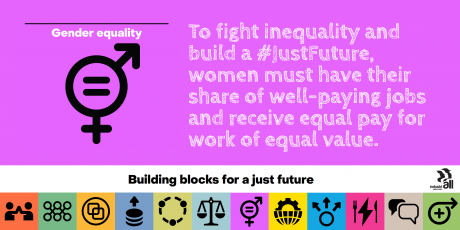Gender equality is a fundamental tenet of the Bahá’í Faith, encapsulating a vision in which both men and women are seen as equal partners in the advancement of civilization. The Bahá’í teachings articulate that the well-being of humanity is contingent upon this principle being universally recognized and embraced. This essay delineates the multifaceted implications of gender equality within Bahá’í teachings and the transformative changes this principle necessitates from individuals and societies alike.
At the core of Bahá’í philosophy lies the assertion that the inherent worth of humanity transcends gender distinctions. The Bahá’í writings convey that both men and women possess the same spiritual and intellectual capacities, suggesting that any system that privileges one gender over the other is intrinsically flawed and detrimental to collective progress. This doctrine posits that societal advancement hinges on empowering women, who have historically been marginalized in various societies. By elevating the status of women, the Bahá’í teachings accentuate their pivotal role in fostering harmony, nurturing future generations, and instigating social reform.
However, achieving true gender equality demands a systemic transformation that permeates various facets of life—from individual attitudes to institutional structures. It compels an introspection of deeply entrenched cultural norms that perpetuate inequality. The role of societal conditioning cannot be understated; traditional gender roles have often dictated the capabilities and aspirations of individuals based solely on their gender. The Bahá’í discourse urges individuals to recognize and dismantle these societal constructs that inhibit personal and communal growth.
Moreover, the Bahá’í Faith advocates for an education system that is inclusive and equitable, thereby allowing both sexes access to the same opportunities. Education is viewed not merely as a means of acquiring knowledge but as an avenue to empower individuals to take part in societal development. The Bahá’í teachings emphasize that the education of girls is as crucial as that of boys, for it leads to healthier families, more vibrant communities, and ultimately, a progressive society. The facilitation of educational opportunities marks a significant step towards altering perceptions, enabling both genders to contribute effectively to society.
Additionally, the discourse surrounding gender equality within the Bahá’í context encompasses the dimension of shared responsibilities in family life. The teachings advocate for a partnership model where men and women collaborate in decision-making processes, thus fostering an environment of mutual respect and understanding. The promotion of shared responsibilities not only alleviates the burden often placed on women but also cultivates a culture of teamwork and equality. This paradigm shift has the potential to recalibrate societal dynamics and redefine the nucleus of family life.
Another salient aspect of the Bahá’í teachings is the notion of justice as an underpinning principle for societal structure. The inherent injustice of gender-based inequality necessitates a conscientious effort to rectify these imbalances. Individuals are encouraged to champion equity, not merely as a legal obligation but as a moral imperative. This pursuit of justice implies the active participation of both men and women in advocating for policies and practices that reflect equality. Bahá’í communities are called to embody this spirit of justice, creating frameworks that safeguard the rights of all individuals, irrespective of gender.
In a broader societal context, the Bahá’í teachings elucidate the importance of global collaboration in achieving gender equality. The recognition that gender disparities are a universal challenge calls for collective action across various cultural and socio-political landscapes. The interconnectedness of humanity necessitates that individuals work together, sharing insights, resources, and strategies to dismantle oppressive structures. The Bahá’í community serves as a microcosm of this ideal, exemplifying how diverse groups can forge unity in the pursuit of common goals. This vision of collaborative effort amplifies the impact of gender equality initiatives, fostering a worldwide movement that transcends divisive barriers.
To effectuate lasting change, it is paramount to engage men as allies in the fight for gender equality. The Bahá’í teachings underscore the responsibility of men to reflect on their roles within the context of gender relations. This includes cultivating empathetic attitudes that embrace vulnerability, allowing men to confront their own biases and participate actively in the struggle against inequality. By engaging men in dialogues about gender issues, the Bahá’í community expands the potential for transformative change that impacts not only individual lives but society at large.
Furthermore, the practice of collective consultation, a hallmark of Bahá’í governance, serves as a model for conflict resolution that emphasizes collaboration and empathy. Within this framework, discussions about gender equality can be approached with candor and mutual respect, encouraging open dialogue about biases and perceptions. Through consultation, individuals can learn from one another’s experiences and insights, thus fostering a deeper understanding of the complexities surrounding gender inequality.
In conclusion, the advancements of society are inexorably linked to the realization of gender equality as espoused in Bahá’í teachings. This principle necessitates comprehensive change on multiple levels—personal, familial, communal, and global. As Bahá’ís strive for the betterment of humanity, the active promotion of gender equality becomes not only a commendable goal but a vital necessity. The journey towards achieving equality is fraught with challenges; however, the teachings provide a robust framework for navigating these complexities. By committing to a path of change, individuals and communities can pave the way for a more equitable future, ensuring that all voices are heard and valued.
